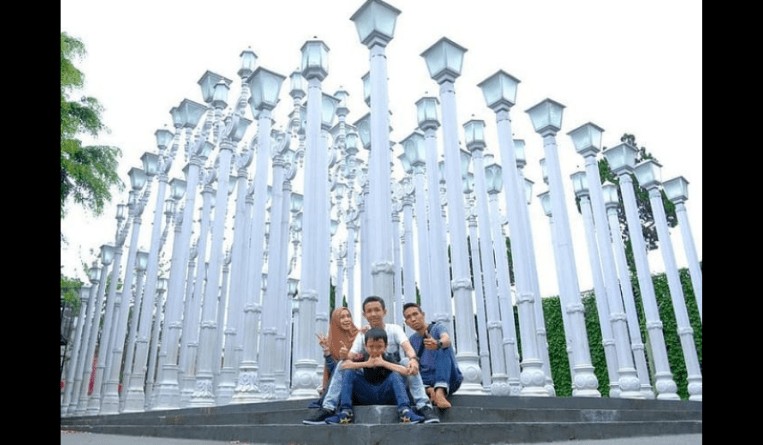Indonesian court orders selfie theme park to take down art installation
25 May 2021
 Image credits: Instagram @rabbittown.bdg
Image credits: Instagram @rabbittown.bdg
In a landmark case, the Indonesian Commercial Court at the Central Jakarta District Court, on April 20, 2021, ordered the selfie theme park Rabbit Town to dismantle its light installation dubbed Love Light due to copyright infringement.
The Court also ordered the theme park to issue a public apology to the Estate of Chris Burden within 30 days. The Burden estate filed the copyright lawsuit on June 4, 2020.
Love Light appears to have copied from Urban Light, a permanent sculpture by the late Burden, a famed American installation artist, at the Los Angeles County Museum of Art (LACMA). Installed at LACMA’s entranceway, the sculpture is one of the most recognizable public artworks in the world and has been featured in the media countless times.
However, the West Java theme park continues to feature its copyright infringing art installation on its social media channels.
The installation consists of multiple lampposts arranged in symmetric fashion, similar to the arrangement of lampposts in Burden’s sculpture.

Among the evidence for copyright infringement which were presented were photographs showing Rabbit Town founder Henry Husada’s daughters posing in front of the disputed sculpture in Los Angeles. According to an article in artnet.com, Husada argued that Urban Light was not a popular attraction in Indonesia.
Indonesia’s Copyright Law No. 28 (2014) states that objects protected under copyright include “artworks in all forms such as paintings, images, carvings, calligraphy, sculpture, sculpture, or collage.”
“There is no specific regulation on what is considered as copyright infringement involving an artistic installation,” said Hani Wulanhandari, a trademark specialist at Tilleke & Gibbins in Jakarta. “Nevertheless, the court ruled that the plaintiff had successfully proven that Rabbit Town had modified the artworks of Chris Burden’s Urban Light installation. In this case, the evidence included the first announcement date of the artworks, photos of the artworks in comparison, and entrance tickets sold by Rabbit Town which prove commercial use.”
The Court also ordered Rabbit Town and Husada to pay Rp1,000,000,000 (US$69,000) to the Burden estate.
Urban Light is not the only artwork deemed to have a duplicate in Rabbit Town. The selfie theme park, which takes advantage of selfies’ global popularity, also appears to have copied from Obliteration Room by Japanese installation artist Yayoi Kusama and from the pop-up Museum of Ice Cream. Yet, only the Burden estate seems to have resorted to legal action.
Will this move possibly encourage the other artists whose copyright may have been infringed by Rabbit Town to also come forward and assert their intellectual property rights?
Said Wulanhandari: “The verdict ordered Rabbit Town to take down the installation within 30 days, but today their social media still appears to be featuring the infringing installation. So the ultimate outcome of this case remains to be seen.”
But while the verdict iscertainly encouraging, Wulanhandari said other rights owners may have some considerations before asserting their IP rights since the court process can be challenging.
“The pre-trial proceedings can be lengthy and costly because the burden of proof is on the plaintiff. The plaintiff is required to gather pertinent evidence through an investigation or sample purchase, witness preparation and expert witness preparation. All in all, the process could be burdensome for rights owners. Some rights owners may also prefer to avoid publication of any dispute as they might deem it contradictory to their ‘self-branding,’” she explained.
However, Wulanhandari added that the verdict will likely boost the confidence of enforcement authorities in Indonesia. It is also likely to assure artists across the globe that their IP rights will be protected and enforced in Indonesia.
“This case is a reminder that the inherent economic rights and moral rights in an artist’s artwork are indeed protected, and it also confirms that plagiarism cases are not required to undergo mediation before the court proceedings,” she said.
Espie Angelica A. de Leon






